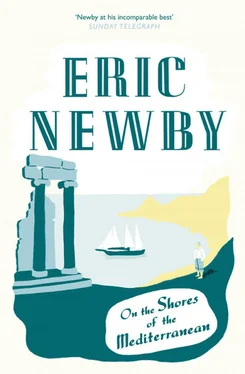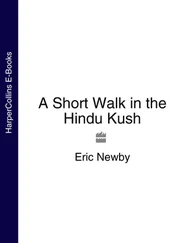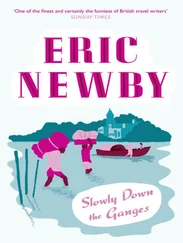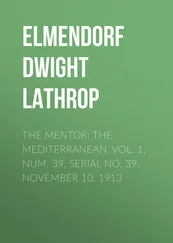‘Because they did not ask me,’ he said. And he seemed to think it a good joke.
Now we lugged our luggage, the young aiding the aged and infirm, along the sizzling expanse of road which constituted the no-man’s-land between the two countries, looking a bit like survivors of some disaster, to the very border of Albania, where we were halted at a barrier by a savage-looking soldier in shiny green fatigues, armed with a machine pistol. To the right was the inlet in which fast little motor boats were kept ready in the shallows, where orangey-yellow water fuchsia were growing. To the left was the steep hillside and, running along the foot of it, an electric fence with white porcelain insulators supporting the wires, about eight feet high with overhangs, which would have made it impossible to scale even if the current was off. It looked as if it was no longer in use and I wondered if it had been the sort that frizzles you to a cinder or the kind that rings bells, or indeed the type that does both, and whether it actually encircled Albania.
The barrier was surmounted by a sign bearing an imperialistic-looking double-headed black eagle and a red star on a yellow background which announced that this was the Republika Popullore e Shqiperise , Shqiperia being ‘The Land of the Eagles’. Knowing that I would have difficulty in remembering how to spell this later on, I began to write it down in a notebook, but the sentry made such threatening gestures that I desisted.
Here, with us all still standing on the Yugoslav side of the barrier, Nanny, our Tour Leader, handed over a multiple visa, procured from the Albanian consulate in Paris, with photographs of all thirty-four of us attached to it, most of them taken in those smelly little booths that can be found in amusement arcades or on railway stations. It made the visa look like an illustrated catalogue for a chamber of horrors and it took the official, to whom he now presented it, some time to convince himself that what he was looking at were real people, although one would have thought that he must have had plenty of experience of looking at similar documents.
It was during the inspection of these credentials, in the course of which we were called forward to be identified one by one, that he discovered that the numbers printed on our two passports did not tally with those on the multiple visa. This was because our old passports had expired when we applied to join the tour and the new ones had not yet been issued to us when the visa was applied for by the tour company because of a strike by British passport officials. Eventually we were admitted, probably because the coach that had brought us to the Yugoslav frontier had already driven away and we would have been a problem to dispose of.
Now, in the customs house, one of the antechambers to Albania, we were ordered to fill in customs declarations, and a wave of collective panic seized the group when it was discovered that the only two languages in which the questions were posed were French and Albanian.
Possèdez-vous les objets suivants Poste émetteur et récepteur, appareil photographique, magnétophone, téléviseur, refrigerateur, machine à laver et d’autres equipements domestiques, montres, narcotiques, imprimés comme lettres, revue du matérial explosif?
As a result of not knowing what a lot of this meant, normally law-abiding members of the group imported radios, tape recorders, copies of English national newspapers, the New Statesman, Spectator, New Scientist and a pictorial souvenir of the Royal Wedding, although one timid girl, asked by a hopeful official if she had any pornography about her, blushingly handed over a copy of Over 21 .
Here, in these otherwise bare rooms, we had our first close-up of Enver Hoxha (pronounced Hoja), founder of the Albanian Communist Party in 1941, First Secretary since 1954 of the Central Committee of the Party, and the Leader, apparently for life (he was born 1908), photographed with survivors of the 1979 earthquake, below a placard with an injunction from him that read:
EVEN IF WE HAVE TO GO WITHOUT BREAD WE ALBANIANS DO NOT VIOLATE PRINCIPLES. WE DO NOT BETRAY MARXISM-LENINISM.
From then on we were confronted everywhere by his smiling, cherubic-mouthed, well-nourished – no sign that he was forgoing the staff of life – slightly epicene image. It was Evelyn Waugh who, while on a wartime mission to Tito, suggested that Tito was a woman and he could with equal propriety, or rather lack of propriety, in both cases belied by their records, have said the same about Hoxha. We saw him on enormous hoardings, sometimes marooned in the middle of fields, usually wearing a silvery-looking suit with matching trilby and carrying a bunch of flowers, like a prodigal son, who has made it successfully into the ranks of the bourgeoisie, returning to visit an aged mother in a hut. Sometimes he was depicted, but usually only in more sophisticated surroundings such as the foyers of tourist hotels, straining to his bosom pampered little girls, of the sort popular with his hero and mentor, Stalin, some of whom were wrapped in equally silvery furs.
‘Shall we be able to see him in Tirana?’ was the first question we asked the Albanian interpreter who would be accompanying us on our tour and who was about thirty-five with streaks of black hair plastered down over a brainy-looking noddle, like a baddie in a Tintin book. He looked at us as if we were a couple of loonies.
The first Albanian I ever met, and the last for some twenty-five years, was Zog, the King of Albania.
It was in Egypt in 1942, and I was spending my leave from the Western Desert in a rather grand house in Alexandria. While I was breakfasting with my hostess, the chef appeared, as he always did at this time of the morning, in order to receive his instructions for the day.
‘There will be twenty to luncheon,’ she said as she did more often than not, at least whenever I was staying in the house, addressing him in French, and the chef inclined his head without batting an eyelid. And to me, ‘I do hope you will come. I am sure the King will enjoy talking to you.’ They then went on to consider the menu in detail.
The King was then forty-nine years old, very tall and very thin and dark with a razor-sharp moustache of the sort I later learned was much affected by Albanians. His Queen, Geraldine Apponyi, a Hungarian countess, was extremely good-looking, if not downright saucy-looking.
The King spoke French with his host and hostess and the various other guests of high rank who were present. From what I could hear he appeared, rather like Edward VIII, to be interested in trivia; but he looked a tough customer. I never spoke to the King or the Queen, being a very junior officer of no consequence. Instead, I got a rocket from a general who was also present for wearing a flannel suit instead of uniform. I told him that my uniform was in a bad state of repair and that it was being mended by an upstairs maid, which impressed him. ‘I don’t have an upstairs maid,’ he said, with unconcealed regret. He also asked me what I was doing and I told him that I wasn’t allowed to tell him as it was supposed to be secret, which was true but didn’t go down very well either. Altogether, it was not a luncheon easily forgotten.
Конец ознакомительного фрагмента.
Текст предоставлен ООО «ЛитРес».
Прочитайте эту книгу целиком, купив полную легальную версию на ЛитРес.
Безопасно оплатить книгу можно банковской картой Visa, MasterCard, Maestro, со счета мобильного телефона, с платежного терминала, в салоне МТС или Связной, через PayPal, WebMoney, Яндекс.Деньги, QIWI Кошелек, бонусными картами или другим удобным Вам способом.












